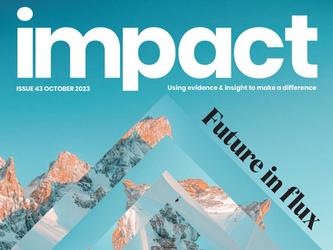Hit for six: An experience of researching discrimination in cricket
What was the premise of the research?
The England and Wales Cricket Board (ECB) wanted to better understand the lived experiences of discrimination in the game. We were hoping we might have 400 respondents [to the survey], and it turned out to be more than 4,000. Much credit should be given to the ECB and the commission for promoting the project and encouraging people engaged with cricket, in whatever capacity, to share their stories of exclusion and inclusion in the game.
Did the high-profile nature of the issue have an impact on methodology?
The presence of the ECB is a strength and a weakness. Some people may have felt that the ECB was best placed to sort things out and, therefore, it was worthwhile contributing their views. Other people might have felt there was little point in contributing if the ECB managed the process. The creation of an independent commission addressed that lack of trust. Independence, transparency and accountability were clearer, which was helpful in increasing confidence and, therefore, willingness to take part.
From data-protection, confidentiality and participant-safety perspectives, the process needed to be rigorous. That goes beyond anonymisation – removing a name, when numbers are small, doesn’t protect confidentiality. Also, some people didn’t want to revisit experiences that were really painful. Many said how tough it was to speak to us, but they did it because they felt a duty to improve the state of the game.
How did you take intersectionality into account?
Before we looked at intersectionality, we examined people’s engagement with the game. Were they recreational players, professional players, coaches, umpires, working for the ECB, parents of children taking part? There were decisions to be made around social class – it is notoriously difficult to measure. The simplest and most relevant way was whether people had attended a state school or a private or grammar school. It is a bad proxy in many ways, but it was relevant to cricket.
From a quantitative perspective, we analysed the data by types – one type was people with intersectional advantages. We then created types of intersectional disadvantage – gender, sex, class and race. You could see the key drivers of discrimination, and ethnicity was the main factor. It was fascinating to see that people were so clear about the reason they got discriminated against – what dimension people react against. We were clear we didn’t want to go back further than five years, as we wanted to be able to say that these are ongoing and contemporary experiences – if we had a suspicion the experience was older than five years, we excluded it.
The research team met regularly, because it felt important, from a safeguarding point of view, to have an opportunity to debrief, share and report back, and for people to get things out of their system. It is a big burden to carry – I wanted the team to be aware of when to escalate to me. What people could hear as researchers could be triggering and feel very real – it is one thing for me to hear about Islamophobia, it is another for someone who is Muslim to hear about someone using a prayer mat to clean up after sex, for example. I felt I had an even greater duty of care to the team because of its diversity and the potential for hurt.
Were there any experiences in the research that stood out?
One thing that stood out was the value of comparative research – using a single process to compare a whole range of experiences, as you see the patterns so clearly. A second thing that stood out was the importance of leadership and modern professionalism in the management of cricket. It means being self-aware, and having due process, transparency and accountability, a complaints process of which people are aware and in which they trust – and which is acted upon – proper redress, and a concern for diversity and inclusion. If we got the basics right, so many issues would be sorted.
When the majority remains silent, it allows bad behaviours to carry on. It is so isolating for the victims of discrimination – they feel alone, powerless and distrusting of their colleagues, the people around them, and the institution. We have to be allies, and this means pointing out, in a clear and consistent way, if basic decency is not honoured in an organisation.
There were numerous examples of discrimination. One university men’s team had more money allocated to their drinking budget than the women’s team received in total; there simply aren’t facilities for women – there is no place for them to shower, for example; women play after all the men’s and boys’ teams.
There were plenty of sexist, racist, Islamophobic and homophobic incidents. Class is less obvious, as a lot is structural, institutional and systemic.
What are your thoughts on the independent panel’s recommendations?
They have been bold and ambitious, as they should be. What the panel has done incredibly well is to make recommendations that are addressable by cricket. It is easy to say cricket is a microcosm of what is happening in society, and the commission has been brilliant at focusing the recommendations on stuff that is incontrovertible.
The panel had a timeline for the ECB to act on the recommendations, and to track and monitor progress against specific outcomes. That’s how you manage an organisation – you use data to change policies and evidence to drive the change you want to see. Every other sporting organisation should do that.
Marie-Claude Gervais is insights director at The Foundation but conducted this research while she was research director at Versiti.
This article was first published in the October 2023 issue of Impact.

We hope you enjoyed this article.
Research Live is published by MRS.
The Market Research Society (MRS) exists to promote and protect the research sector, showcasing how research delivers impact for businesses and government.
Members of MRS enjoy many benefits including tailoured policy guidance, discounts on training and conferences, and access to member-only content.
For example, there's an archive of winning case studies from over a decade of MRS Awards.
Find out more about the benefits of joining MRS here.














0 Comments